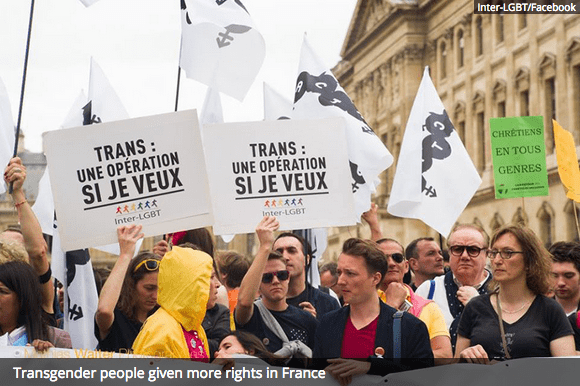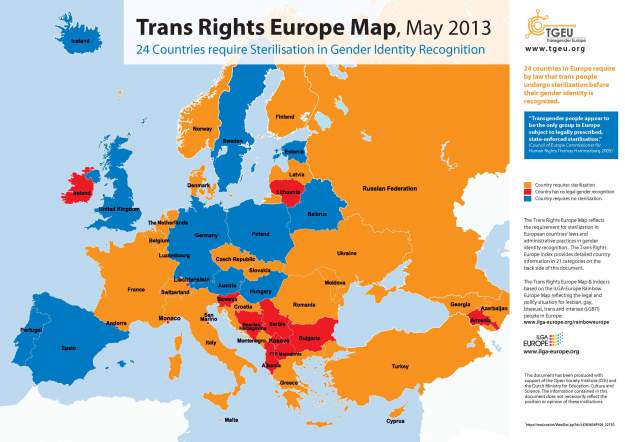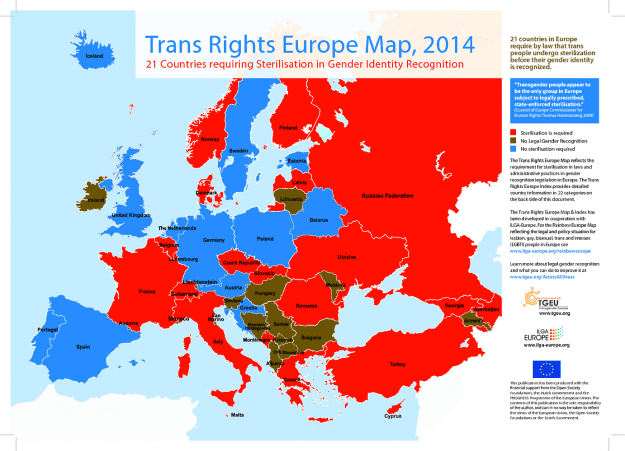In many European nations as well as some states in the U.S., to be who you want to be, who you need to be, who you desire to be, you may have to be first sterilized. In the first half of the 20th century, countries around the world, instituted sterilization policies as part of eugenics programs intended to prevent the reproduction of members of the population considered to be carriers of defective genetic traits. Was this the reason for bundling transgender individuals into the sterilization practice?
Other bases for compulsory sterilization have included general population growth management, sex discrimination, "sex-normalizing" surgeries of intersex persons, limiting the spread of HIV, and reducing the population of ethnic groups.
…
Some countries require transgender people to undergo sterilization before gaining legal recognition of their gender, a practice that the United Nations Special Rapporteur on torture and other cruel, inhuman or degrading treatment or punishment cites as a violation of the Yogyakarta Principles.
If the UN has stated compulsory sterilization is cruel, inhuman, why isn't it banned all over? France just joined the list of nations on the right side of humanity.
Gay and transgender activists have welcomed a new French law that lets transgender people change their legal status without having to be sterilised.
The activist group ILGA-Europe called it "clear progress" that "another European country has dispensed with the shameful practice of sterilisation". But it regretted that trans people in France will still have to get a court to recognise their gender change.
Laws in Denmark, Malta, Ireland and Norway have gone further, it said. In those countries, legal gender recognition relies on the principle of "self-determination" – dispensing with medical or judicial requirements. That principle was also advocated by the Council of Europe – the top European human rights watchdog – in an anti-discrimination resolution last year. The Council of Europe says transgender people often face discrimination in Europe, in the workplace, housing, health services or in the form of bullying and hate speech. Gender has to be specified on passports, driving licences and many other essential documents.
Activists estimate there are tens of thousands of transgender people in France, but there are no official figures. The French law passed on Wednesday gives trans people – adults and minors – the right to change their legal status in court. Previously such a change required proof that the person had been sterilised irreversibly.
The UK, Spain and some states in the US also no longer require transgender people to be sterilised before they can get their gender officially changed. – bbc.com
Will other countries follow France's lead. It is 2016. We should be over practices that was once considered a tool of genocide.
For the first time TGEU publishes a Trans Rights Europe Map & Index. The map shows that 24 countries in Europe require sterilization in legal gender recognition while a total of 16 countries do not provide for any possibility to change name and gender at all.
This means that transgender people remain barred from active participation in social and economic life. Applying for a job, opening a bank account, boarding a plane can be challenging or even be impossible. – tgeu.org (2013)
h/t: bbc.com




